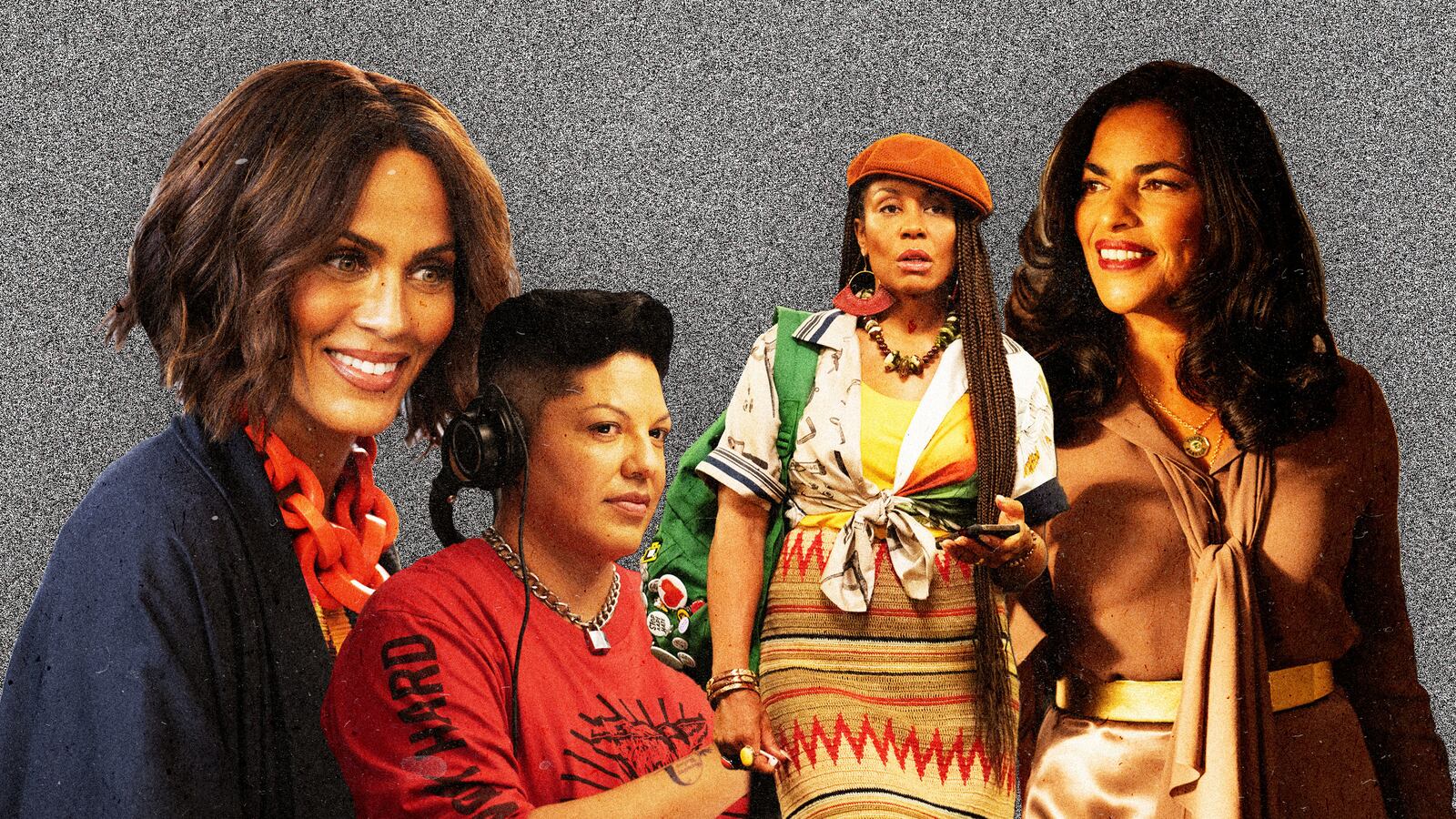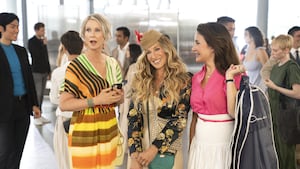Ever since HBO Max announced it was reviving the iconic late ’90s series Sex and the City, it’s been clear things were going to be different this time around.
And it wasn’t just the absence of Kim Cattrall’s beloved Samantha Jones that would be among the shakeups—the series was also bringing in a handful of new faces, saying goodbye to some old friends, and even boasting a brand new title, And Just Like That. All those changes seemed to signify a fresh chapter in the lives of Carrie, Miranda, and Charlotte, who were now in their mid-fifties and had stuck by each other through marriages, divorces, Post-it note breakups, and many cosmopolitans.
But this new era wasn’t just about seeing fabulous women running around New York City and giggling at their sexcapades. It was also a chance to rectify some of the original series’ shortcomings, executive producer and showrunner Michael Patrick King recently explained.
Producers wanted to bring And Just Like That, which premiered on Dec. 9, into today’s world by intentionally addressing the elephant in the room: the fact that there were hardly any people of color featured in the original 94-episode series.
“We changed the title as a significant reminder that it’s slightly different,” King said. “It’s the same characters, but it’s a new world. So when we decided we’re going to shift the frame of everything—who else is in the world who we didn’t see before? What’s in the world right now that wasn’t in the world, on these characters’ tongues, when they were 35? And what that is, is race, sex, privilege.”
It’s no secret that the OG Sex and the City was seriously lacking in diversity. Out of all the many partners Carrie Bradshaw, Miranda Hobbes, Samantha Jones, and Charlotte York dated in the multicultural mecca that is New York City, only two men were Black, and one woman was Brazilian.
One of the only Black actresses featured on the original show was Sundra Oakley, who appeared in Season 3’s “No Ifs, Ands, or Butts,” playing the up-and-coming chef Adeena, whose entire storyline revolved around her disapproval of her brother Chivon’s (Asio Highsmith) relationship with Samantha because she was white. There are several cringe-worthy lines in the episode, including Samantha talking about Chivon’s “big Black cock.” And while Oakley told Vanity Fair in 2018 that her filming experience was overall positive, in hindsight, she felt a small pang of regret.
“When I was looking at it through the lens of 20-years-ago Sundra, I was happy to have this job and work on this fabulous show,” Oakley told Vanity Fair. “[But] even a few years later . . . it’s like, oh man, why did it have to be that way? Why couldn’t it have been a different story?”
The lack of racial diversity wasn’t Sex and the City’s only problem with representation. Sarah Jessica Parker admitted in 2018 that “there was no substantial conversation about the LGBTQ community,” as transphobic jokes were sprinkled into some episodes, bisexuality was largely ignored, and Samantha striking up a relationship with a woman was dismissed by her friends as simply a phase.
To put it mildly, there was room for improvement.
King decided to get things squared away quickly, and following the initial news of the revival in January—which confirmed the return of Parker, Cynthia Nixon, and Kristin Davis—the next announcement was that non-binary actor Sara Ramírez was set to play newcomer Che Diaz, a queer stand-up comedian. Nicole Ari Parker and Karen Pittman, who are both Black, then joined the cast over the summer, along with British-Indian actress Sarita Choudhury.
In the revival series, the four new characters are paired up with one of the original women. Choudhury is Carrie’s powerhouse real estate broker who is tasked with selling Carrie and Mr. Big’s glamorous apartment. Ramírez’s character knows Carrie through their dating and sex podcast, and also seems to be forming a friendship (or maybe something more?) with Miranda.
Meanwhile, everyone’s favorite corporate lawyer has ditched her pantsuits in favor of a backpack, as she seeks a master’s degree in humanitarian law at Columbia University after deciding that wearing a pink pussyhat just wasn’t going to cut it anymore. But Miranda has a car-crash moment on her first day of class with Pittman’s Dr. Nya Wallace, blurting out a stream of microaggressions and then similarly flailing during their subsequent encounters.
And Charlotte is desperate to become BFFs with Nicole Ari Parker’s Lisa Todd Wexley, who gives Carrie a run for her money when it comes to being the show’s resident fashionista. The humanitarian-documentarian is considered the “It Mom” of the world of private schooling for Upper East Siders, and Charlotte struggles when she’s introduced to Wexley’s predominantly Black friend group.
For King, it wasn’t just about ticking a diversity box and sticking people of color and queer characters haphazardly into the show, but making sure these new faces would authentically fit into the world that Carrie, Charlotte, and Miranda already live in.
“We wanted to make any gesture that was about society personal more than polemic,” King explained. “We tried to put it into character and see how these characters would interact with each other—each one is designed to start in the wheelhouse of the main character.”
It wasn’t all smooth sailing for the original trio. In the first two episodes, a normally switched-on Miranda has a very rough time navigating her conversations with Pittman’s Dr. Wallace. In her earnestness in becoming an advocate for underserved and minority communities, not only did Miranda word-vomit while explaining that she didn’t realize Wallace was her professor because her hair was in braids, but she also needlessly inflamed an innocuous encounter between Wallace and a campus security guard.
Unbearable as it is to watch those scenes unfold, Pittman said she’s grateful that the show leaned into such uncomfortable moments between its white and Black characters.
“When I first read those scenes, I thought, wow, this is a great way to start because quite honestly, it’s really authentic,” Pittman said. “It’s kind of how I started every relationship with someone I’ve sort of had weird, awkward moments with.”
“That’s the product of having a diverse writers’ room. They can understand the nuanced conversation around microaggressions that can happen around something as very small as your hair being different. I thought it was a nuanced conversation around women and race, and Black women and white women, and what that looks like.”
She added, “I do think that it’s an interesting place to be in, to be speaking to our ‘woke’ audience, who are like, ‘Oh, I’m woke.’ But are you woke? Is that true? And if you’re not, how funny could that be? We weren’t trying to teach anything, but we were trying to show what it’s like when two people walk all the way through that moment and at the end of it, they actually ended up being friends.”
Nicole Ari Parker said the writers intentionally allowed these new characters to exist as themselves, letting Carrie, Miranda, and Charlotte figure things out on their own instead of placing the burden of education about race and sexuality on the queer and people of color characters.
“Someone made that creative choice at the top and in the writers’ room: ‘Let’s be doubly aware that we’re not creating a PowerPoint presentation from the Black characters,’” she said. “Let all of that stuff happen on the subway, right in real time. Let’s have all of that stuff happen over a cup of coffee and let them struggle with it.”
“These women actually have a lot in common,” she added. “But race, our climate, and our time requires a whole lot of debriefing, and bumps and hurdles for us to get to that friendship.”
Ramírez, who uses they/them pronouns, said they were thrilled that And Just Like That intentionally made space for queer and trans people, and appreciated that the series didn’t tumble into the pitfall of having one character represent an entire community.
“Che is one individual representation of one multidimensional human character who gets to be funny and witty and problematic and dynamic and messy and human,” they said. “This is one representation. We know that visibility isn’t justice, but visibility is important. Visibility is about giving people permission to see themselves, giving permission to people to see others’ existence.”
And as a longtime fan of the show, Ramírez said they’ll be right alongside the audience in seeing if And Just Like That “can meet this moment in 2021 when so many important conversations are needed.”
“It really does matter,” they added.








